- Home
- Stacey Kade
For This Life Only Page 4
For This Life Only Read online
Page 4
A hand caught at mine, startling me.
I glanced down in surprise. I hadn’t even realized I’d stopped moving.
An old woman, in her seventies or maybe eighties, smiled up at me and closed her other hand over mine, clasping it. Her bones were frail beneath that paper-thin skin, the dark blue veins between her knuckles ropy and prominent.
“God saved you for a reason,” she said with a knowing wink of her watery blue eyes. “He brought you back for a purpose.”
At her words, hot plumes of acid flooded the back of my throat. I was going to be sick on the floor in the sanctuary if I didn’t move.
I tore free from the elderly woman’s gentle grasp. “Sorry,” I managed, and headed as fast as I could for the doors at the back. A wave of gasps followed my retreat.
I made it through the narthex and down the steps outside, barely, before heaving my orange juice into the bushes, right below the Riverwoods Bible Church sign.
CHAPTER FIVE
* * *
THE RUMBLE OF THE garage door signaled the approach of my fate. It also served as a three-minute warning, sending everyone scrambling to find their places.
“Jace, table, now!” My mom called from downstairs, and by the time I made it to the railing at the top of the stairs that overlooked the lower level, she was already moving into the dining room.
She glanced up at me, her hands full with the serving platter of roast beef. “Grab the potatoes, please.” Her thumbs were white on the edge of the plate.
Family dinner on Sunday was a requirement, no matter what else was going on. Baseball, debate team, whatever. Didn’t matter.
Even on days when I bolted from church and made a huge scene, apparently. Not that I was the only one. Sarah had flipped out, crying and screaming, as soon as I was out of sight.
When my mom had found me outside, racked by dry heaves, she’d said nothing. Just started for the van, a sobbing Sarah clinging to her legs.
Once we were in the van, heading home, she asked, without looking at me, “It’s too much, right? That’s all. It’s too hard to be there without him.” Her voice had broken on the last words, her hand flying up to cover her mouth. She was, I was sure, describing her own feelings as much as mine.
So I’d simply nodded.
I couldn’t talk to her, not just about Eli but about what I’d seen—or hadn’t—that night when I was . . . gone. The blackness where there should have been light, and the creeping fear of what that meant. And telling my dad? Forget it. He’d probably cite chapter and verse from the Bible, just as Eli would have. And I might be tempted to let him try. Except I didn’t want to know how much worse it would feel if he failed to make his case.
I limped downstairs to the kitchen, grabbed the bowl of mashed potatoes off the island counter, and followed my mom’s path into the dining room.
The sight of five chairs at the polished wooden table made a bolt of fresh pain go through me, as it always did. My mom and Sarah on one side, me and Eli on the other, with my dad on the end. That’s the way it used to be, anyway.
Sometimes, I wished they would rearrange our places and take the extra chair away, instead of leaving it there like a broken tooth that everyone pretended not to see.
Bracing myself, I sat in my chair. Sarah’s place was set, but she was, per her now usual behavior, on the floor beneath the table. Patsie sat as guardian in her chair.
I peeked beneath the table to see what she was doing.
She was tucked against the legs of her chair, making two of her My Little Ponies gallop along the bottom rung. Her mouth moved with silent horse noises, hooves clopping, maybe.
“Hey,” I whispered. “Are you okay?”
She ignored me, her ponies pausing only for a second before continuing their journey.
I straightened up as my mom returned from the kitchen with a basket of rolls covered in a green cloth napkin that matched the place mats.
Everything looked magazine-perfect, except for us. My mom wore that excess worry in the wrinkles in her forehead, and Sarah was a ghost. And me . . . I didn’t want to think about what I looked like in this messed-up diorama of “home.”
The steady clip of my dad’s wingtips grew louder as he crossed from the mudroom through the family room to the hall.
I steeled myself for the lecture, his downturned mouth, the carefully measured anger and disappointment in me. Again.
I’d been here more times than I could count—getting in trouble for something I’d done or said. Sunday dinner was always the reckoning.
But my dad just dropped into his chair with a sigh, removing the white plastic collar at his throat.
“Looks great,” he said to my mom.
“Great,” my mom said back to him with a forced cheeriness.
I watched them both warily. What was this?
“Sarah, do you want to lead us in grace?” my dad asked.
There was no response. Which wasn’t a surprise. That was exactly how it had been last week and the week before that and the week before . . .
Without missing a beat, my dad started instead. “Come, Lord Jesus, be our guest and let these gifts to us be blessed. Amen.”
The serving spoons clanked against the bowls as my dad served himself and then passed everything to my mom. Like everything was normal, which was the most abnormal response I could think of.
My mom put tiny portions on Sarah’s plate, concentrating on cutting her meat and doling out peas on her plate as if they were individually numbered and needed to be in the correct order.
The silence grew thicker and heavier with every second that passed. No one said a thing, not even when Sarah appeared only long enough to grab her plate and take it beneath the table with her.
“Can you pass the butter?” my dad asked, and I jolted at the break in the quiet.
My mom handed him the butter plate and matching knife.
Was no one going to say anything? Really?
“Jace,” my mom prompted.
I tensed, my hand tight around my fork.
“Give me your plate.” She waved her hand at me in a summoning gesture.
Oh.
I passed it across to her and she loaded my plate as carefully, cutting my meat as she had Sarah’s. It was as embarrassing as it was necessary. I could manage a fork right-handed, but a knife and fork would require both hands and my left arm wasn’t fully cooperating, especially with anything that required precise movements.
“How were the other services?” my mom asked my dad as she handed me back my plate.
Finally. Now it was coming. I steadied myself in my chair. Jacob Christopher, what were you thinking?
“Attendance was up. We had some AV issues, but John said that it was localized to the auditorium, the broadcast should be fine.” My dad focused on mixing his peas into his potatoes.
“That’s good.”
I waited, my breath shallow.
“Jacob,” my dad said.
I found I couldn’t look at him, not for a long moment. When I managed to, he barely glanced in my direction.
“Can you pass the rolls, please?” he asked.
I passed them over, and he took them without further comment.
That was it?
My spine sagged toward the back of my chair. I should have been relieved. But instead, anxiety bloomed like an impossible itch beneath my skin.
It was a familiar pattern: get caught, get yelled at and/or punished, and get forgiven.
But now what? What did the non-acknowledgment of my mistakes mean?
I forced myself to pick up my fork and eat a bite of roast.
Maybe this was what happened when you were no longer forgivable, no matter what punishment or penance you were willing to do. We’d never talked about the accident, not after that first day in the hospital.
The quiet clanking of silverware continued, along with my mother’s measured questions about church and my dad’s short answers.
The weight of everyt
hing unspoken pressed down on me from above, until I wished I could hide under the table with Sarah. Part of me wanted to shout, to make them look at me and see me. Except I was a little afraid that if I did, they’d just keep passing the food.
I swallowed another dry bite of roast.
No matter how much I’d been dreading going back to school tomorrow, it had to be better than this. Or at least not as awful.
School was secular, away from all my questions and doubts, and away from this house, where everything triggered a memory of Eli. At school, Eli and I had moved in different circles, with different friends.
Maybe tomorrow, for a few minutes, I could escape, even if I didn’t deserve to.
CHAPTER SIX
* * *
“YOU’RE SURE ABOUT THIS?” my mom asked, for the third time, as she made the final turn into the high school parking lot. It was jammed with cars and people flocking toward the main building.
The sight of them, friends and strangers, laughing, talking, shoving into each other, like everything was normal, simultaneously filled me with relief and made my stomach ache like someone had reached in and hollowed out my guts.
I fought the urge to look over my shoulder to the second seat, where Eli used to sit. He was always a moment too slow in calling shotgun.
“Jacob?”
“It’s fine,” I said. The truth was, no, I wasn’t sure. But maybe focusing on something else like school would help.
I let the silence spin out as further answer because there was nothing else I could say.
“Okay,” she said, sounding helpless and resigned. “I’ll be here at three to pick you up for PT.” She put the van in park, directly across from the main front doors, where everyone was gathering, waiting for the first bell.
I nodded, shoved the door open, and then bent down to pick up my overloaded backpack from the floor with my good arm. Almost two months of assignments, and all of my books for the semester were not light.
“Thanks for the ride, Mom,” I said as I half slid, half stepped out of the van and then slammed the door closed.
The van idled in the turnaround for a few more seconds: my mom waiting to see if I’d turn back.
But I didn’t. I couldn’t go home, not right now.
I limped toward the bike rack to the left of the main doors, where my friends usually waited. It felt like centuries since I’d last been here. The plastic walking cast on my leg made a rough, grating noise on the concrete that I could hear even over the laughter and talking from everybody.
People noticed me right away, some of them moving out of my path. Whether to give me more room to pass or to have a better look, I wasn’t sure. A couple nodded hello to me, but most seemed content to stare.
My friends were crowded near the doors, as usual. Kylie was the first to see me. Her hands flew up to her mouth, the color draining from her face.
“Hey, man, welcome back,” Derek managed after a minute.
“We didn’t know you were coming today,” Matt offered, shifting his weight from foot to foot before stepping up to bump his fist with mine.
When he moved back, an awkward silence reigned. I shouldn’t have been surprised. I hadn’t responded to any of their texts or called them back since the accident. I didn’t know what to say to them, then or now.
Kylie took a big, gulping breath, her eyes watery and her mascara leaving smudges on her cheeks, and I wanted to run. “Are you . . . I mean, is everything . . . ,” she tried.
Derek cleared his throat. “So sorry about Eli.” The pity in his expression made my skin feel tight, and the urge to run increased.
I only wanted a moment of normal, but I was beginning to realize that normal no longer existed, anywhere.
“Excuse me. Hey, watch out. Coming through.” I heard Zach’s voice before I saw him, and I turned. The top of his dark red hair bobbed toward us as he cut through the crowd almost as easily as I had.
Zach jerked his chin in greeting when he broke through. “Hey, man, what’s up?” he asked with a smile that eased some of the tension in me and everybody else. I could almost hear my other friends drawing a relieved breath at his arrival.
“I heard you were coming back today,” he said. “Why didn’t you text me?” Like everything was normal. He was good at that, smoothing things over. Pretty much the opposite of me. We’d been best friends since kindergarten.
“We were waiting for you,” Audrey chimed in, trailing after him. Her green eyes went wide as soon as she saw me up close. “Oh, my God, your face.”
“Audrey,” Zach said sharply.
“I . . . I’m sorry,” she faltered. “I didn’t know.” Then she turned to Zach. “You said it was just his leg and his elbow,” she hissed at him.
Behind me, I could sense Kylie and the others shifting, uncomfortable.
“It is, mostly,” I answered for Zach. “The scar will fade.” That’s what the various medical professionals kept telling me. If not, they said there was always plastic surgery. I’d been lucky to come away with only one long gash from the top of my left temple down past my cheekbone. The majority of the windshield had splintered and broken away before I went through it.
Honestly, most of the time I forgot about the reddish-purple mark, when I wasn’t looking in the mirror, which I did as little as possible.
Zach and Audrey nodded, almost in unison, their hands interlaced tightly between them.
“Did your mom tell you I stopped by last week?” Zach asked, stuffing his free hand deep in the pocket of his letterman’s jacket. I had an almost identical one hanging in my closet at home.
“Yeah, sorry, I didn’t feel up to talking.”
“Kind of picked up on that,” he said. Audrey elbowed him, and he grunted as the air escaped his lungs. “Sorry,” he added. “I just wanted to make sure you were okay. After I came over that one time, it seemed . . .”
Messed up. Heavy. Depressing. Awful. Any one of those words could apply. Zach had brought over all my books and assignments the week I got home from the hospital. That was before my parents had implemented their “act normal” strategy. So, at that point, my dad was basically living at the church office, burying himself in work; my mom was prone to crying silently outside Eli’s door; my sister was mid-transformation to silent ghost; and I was a zombie, drugged up on pain meds, foggy and struggling to get a grip on what I’d caused.
It wasn’t a whole lot better now, honestly.
“I wanted to come back, but your mom said I should wait until you were better. And you never texted me back . . .” Zach trailed off helplessly, running out of words.
“It’s okay,” I said. “Not your fault. I was trying to figure out some stuff.” Which was a lie. Made it sound like I’d actually gotten somewhere in the last few weeks. But maybe it was better to pretend. Maybe Mom and Dad were onto something.
Zach bobbed his head in acknowledgment, his shoulders losing tension and dropping to a more normal position.
But I sensed there was more, from the look he and Audrey exchanged with each other.
“About that night—” Zach began.
“—we’re so sorry,” Audrey put in. “If we hadn’t gotten in that stupid fight—”
“You were counting on me to be DD, man, and I shouldn’t have—” Zach continued.
“It’s all right,” I said. I didn’t want them to go over it all again—didn’t need them to. I’d done it a thousand times or more in my head. It wasn’t their fault. It was mine.
The awkward silence returned for a long moment. Matt, Kylie, and the others behind me started a separate quiet conversation. And everyone else around us had gone back to whatever they were doing, but some of the closer ones were listening.
My gaze caught on a girl standing with a cluster of her friends. She was the only one facing me, and her cheeks were wet with tears that had cut tracks in her makeup. Her eyes were red-rimmed and swollen behind her thick-framed glasses. Her sweatshirt said BIG TALK, BIG WALK in huge letters
. Debate team.
I looked away from the girl.
“So, uh, let me see your schedule,” Zach said with forced cheer, drawing my attention to him. “I don’t know where you’re at this semester.”
Silently, I dug into my pocket for the crumpled sheet of paper and then handed it over.
Zach released Audrey’s hand to take the page and unfolded it. “Government first hour? That blows.”
Audrey made a sympathetic noise, her anxious gaze bouncing between my face and Zach’s.
“But I heard Mr. Peterson will give you extra credit if you—” Zach stopped and frowned at the paper. “Whoa, wait a minute. They messed this up. They took you out of lifting and put you in Pussy PE.” He looked up at me, confused.
Varsity athletes took weight lifting and training, so we could stay in shape in the off-season. No pathetic pickle ball, badminton, or bowling for us. “Pussy PE” is what everyone called the study hall for kids who were too messed up to handle even regular gym.
In other words, me now.
“Zach,” Audrey said through her teeth in protest. But it had no effect. He was staring at me, waiting for an answer.
“I can barely walk, dude,” I pointed out, trying to clamp down on my frustration at being forced to discuss the obvious. “Running and lifting are kind of out of my reach.”
I’d wanted to fight that change in my schedule, but what was I going to do? Sit on the bleachers for the next three months? Plus, I’d been overruled by my mom and Mrs. Schultz, the guidance counselor, who both thought the additional study time would be more valuable in helping me catch up so I could graduate on time.
“Yeah, but Coach is going to be pissed if you’re not in shape for the season.” He paused, and I saw it click for him for the first time. His eyes widened. “You’re not . . . wait, are you out for good?” He sounded horrified.
Yes, I was. Left-handed pitchers are prized beyond all measure, but once you shatter your elbow, you’re damaged goods, a ticking time bomb waiting to land on the disabled list at the worst possible moment. No serious college team is going to take that chance, not when there are so many other players competing for the same spot. Coach and I had already had this conversation, when he’d come by the house a couple of weeks ago.

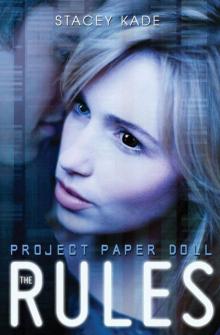 The Rules
The Rules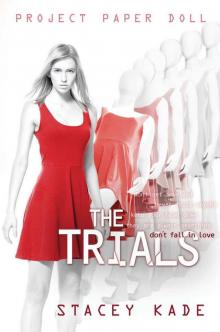 The Trials
The Trials For This Life Only
For This Life Only The Ghost and the Goth
The Ghost and the Goth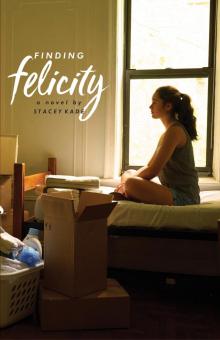 Finding Felicity
Finding Felicity The Hunt
The Hunt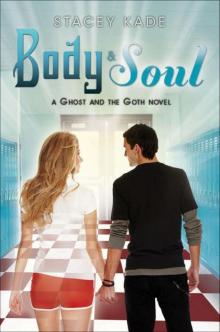 Body & Soul
Body & Soul Starlight Nights
Starlight Nights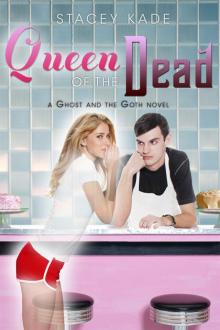 Queen of the Dead tgatg-2
Queen of the Dead tgatg-2 The Ghost and the Goth tgatg-1
The Ghost and the Goth tgatg-1 738 Days: A Novel
738 Days: A Novel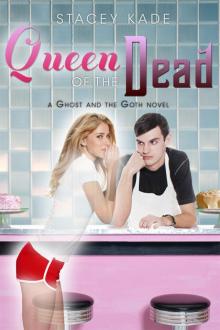 The Ghost and the Goth 2 - Queen of the Dead
The Ghost and the Goth 2 - Queen of the Dead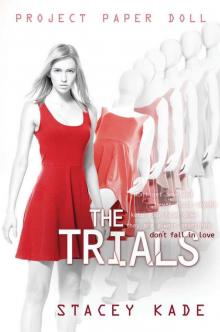 Project Paper Doll: The Trials
Project Paper Doll: The Trials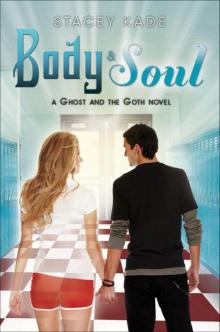 Body & Soul (Ghost and the Goth Novels)
Body & Soul (Ghost and the Goth Novels)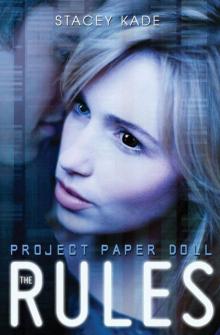 Project Paper Doll
Project Paper Doll